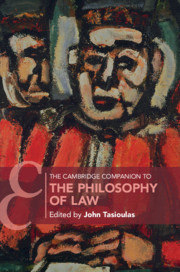Book contents
- The Cambridge Companion to the Philosophy of Law
- Cambridge Companions to Law
- The Cambridge Companion to the Philosophy of Law
- Copyright page
- Dedication
- Contents
- Contributors
- Introduction
- Part I General Theory
- 1 Methodology
- 2 The Nature of Law
- 3 Legal Reasoning
- 4 Law and Living Well
- 5 Social Science and the Philosophy of Law
- Part II Values
- Part III Special Theory
- Index
2 - The Nature of Law
from Part I - General Theory
Published online by Cambridge University Press: 15 June 2020
- The Cambridge Companion to the Philosophy of Law
- Cambridge Companions to Law
- The Cambridge Companion to the Philosophy of Law
- Copyright page
- Dedication
- Contents
- Contributors
- Introduction
- Part I General Theory
- 1 Methodology
- 2 The Nature of Law
- 3 Legal Reasoning
- 4 Law and Living Well
- 5 Social Science and the Philosophy of Law
- Part II Values
- Part III Special Theory
- Index
Summary
Recent work in philosophy of law includes many discussions of law’s ‘nature or essence’, understood as those properties of law that are necessary, or at least important and typical or characteristic of ‘law as such, wherever it may be found’1 (or that help explain how and why law can be considered a kind, and laws or legal systems its instances or instantiations). Some hold that law has no nature; only natural objects have a nature, and law is artefactual, not natural. Others reply that there are kinds of artefacts: paper clips differ in nature from printer drivers, and being a soft cheese blob excludes being a paper clip – excludes being something of that kind or nature. Attention is shifting promisingly to paradigms of artefact more relevant to law than paper clips are: assertions, for example.2
- Type
- Chapter
- Information
- The Cambridge Companion to the Philosophy of Law , pp. 38 - 58Publisher: Cambridge University PressPrint publication year: 2020
- 2
- Cited by

